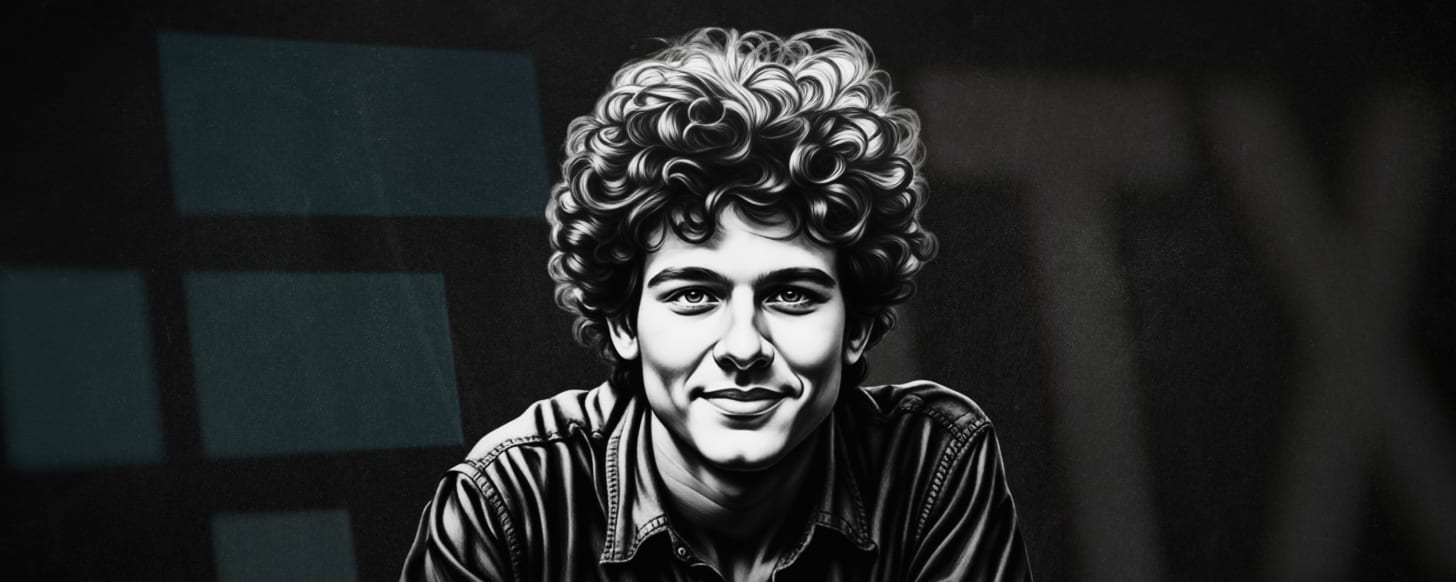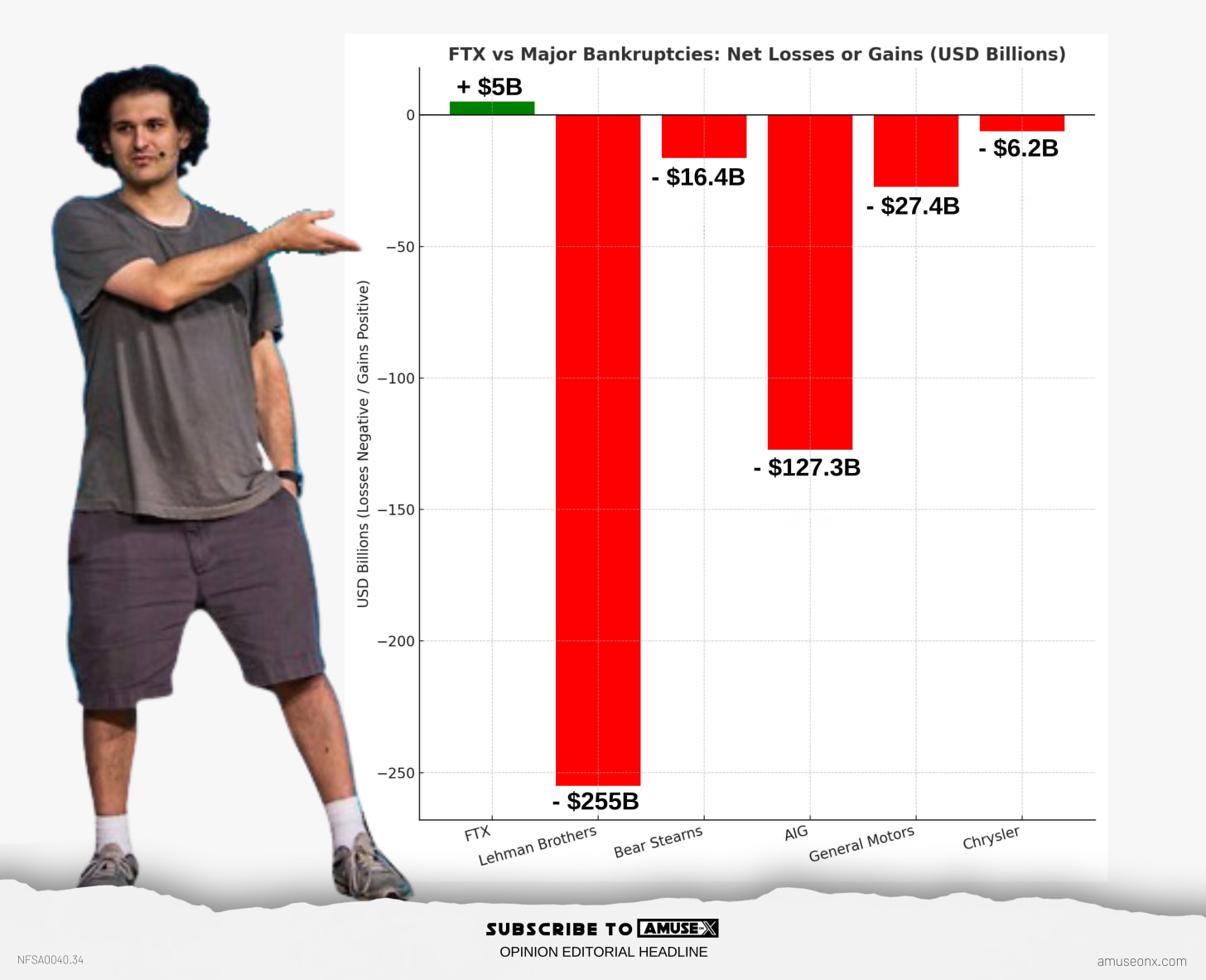Sam Bankman-Fried’s story did not end in the courtroom where he was sentenced to prison; it continues in the spreadsheets, balance sheets, and forgotten ledgers that tell a radically different tale from the one the public was sold. In our correspondence, relayed through a friend via the slow and censored prison email system, Sam was calm, analytical, and reflective. He read science fiction by the dozens, losing himself in imagined worlds, perhaps because in this one his own creation had been dismantled by lawyers who understood neither crypto markets nor the company they gutted. He is thinner, quieter, and, in his words, “learning to write when I have something to say.” And what he has to say now is worth hearing, because the official story of FTX’s collapse may be one of the greatest miscarriages of financial truth in recent memory.
According to the numbers Sam shared with me [Where Did the Money Go 9/11/25], FTX was never insolvent. Not in November 2022 when he handed over control under pressure from lawyers and regulators, and not even at the bottom of the market crash. By his accounting, FTX held $15 billion in assets against $8.4 billion in liabilities at the moment of bankruptcy. That gap, he argued, should have been the margin that protected customers and creditors alike. Instead, bankruptcy lawyers declared the company “hopelessly insolvent” and liquidated assets at fire-sale prices. Today, every creditor is being repaid in full, with profits, but billions that could have been recovered remain lost, consumed by professional fees, legal wrangling, and decisions made by those who, in Sam’s words, “had no idea what they were doing.”
The popular narrative painted FTX as a house of cards, a reckless startup run by an erratic founder who commingled funds and defrauded investors. But the deeper truth is more complicated. FTX operated like many fast-moving technology ventures, iterating rapidly in a space where the law had not yet caught up. The irony, as Sam now admits, is that the company’s real vulnerability came not from fraud but from compliance: an obsessive effort to satisfy regulators who seemed determined to punish rather than guide. “Our developers spent half their time jumping through hoops for regulators,” he told me. “Instead of focusing on building safeguards or risk management tools, we were producing reports no one read and presentations no one believed.” The consequence, he believes, was fatal distraction. By the time the market panic hit, FTX’s internal systems were burdened with bureaucracy, its leadership exhausted, and its founder overwhelmed by conflicting legal advice.
When the walls began to close in, Sam did what most would have done under that pressure: he turned to experts. The problem was that those experts were not aligned with his mission to protect customers. They were aligned with their own incentives, to file bankruptcy, assume control, and bill the estate. “Their pressure was massive,” he said. “They made promises they immediately reneged on.” In hindsight, he believes that was his greatest mistake: backing down instead of standing firm. “FTX was solvent, with billions to spare,” he told me. “But customers had leverage, and I was told that surrendering control would help them. It didn’t. It helped the lawyers.”
There’s a moral subtlety here that rarely enters public discourse. Responsibility, Sam insists, does not mean guilt. It means choosing to be cause rather than effect, to own one’s role in the creation of events. In that spirit, he does not deny his misjudgments. He regrets, deeply, that he ceded control when leadership was most needed, that he failed to oversee Alameda’s risk exposure, and that his focus drifted toward regulatory politics rather than operational clarity. But he also rejects the caricature of the villain who stole billions. His real failure, he suggests, was one of leadership, not larceny.
If this sounds like revisionism, consider the facts. The bankruptcy estate has already distributed billions to creditors, more than their original claims, thanks to asset appreciation. This means that every customer, every investor, and every creditor will emerge whole or better. No one lost money. The same cannot be said of Lehman Brothers, Bear Stearns, AIG, General Motors, or Chrysler’s victims. Yet while all of those executives walked away disgraced but free, Sam faces years in prison for presiding over what, by the numbers, was a temporary liquidity crisis compounded by panic and poor counsel. The people who truly profited are the ones who took over after his removal: the lawyers, consultants, and advisors who charged over a billion dollars in fees to unwind a company that wasn’t broken.
The contrast could not be sharper. FTX, left to recover naturally, might have been one of the great comeback stories in financial history. Instead, it became a feeding frenzy for professionals rewarded for failure. The lawyers sold assets prematurely, missing out on the crypto market rebound that could have multiplied recoveries many times over. In Sam’s estimate, the estate could have generated an additional $125 billion if managed prudently. Instead, they sold at the bottom, congratulated themselves for solvency that already existed, and cashed checks funded by the very stakeholders they were supposed to protect.
That absurdity, the inversion of merit and reward, lies at the heart of this tragedy. The founder who built one of the most sophisticated exchanges in history sits in a cell, while those who dismantled it enrich themselves. Even now, Sam’s reflections carry the tone of someone trying to understand how a system designed to preserve order ended up devouring value. “When you’re convicted in the court of public opinion,” he wrote, “taking responsibility for anything is seen as admitting guilt for everything.” His frustration is palpable, yet there is no self-pity. Only the curiosity of a mind still trying to solve the puzzle of its own undoing.
In another life, Sam might have been the kind of reformer who reshaped finance by marrying transparency and technology. FTX’s liquidation engine, a system that automatically managed margin and risk, was, by industry standards, revolutionary. Traditional finance firms are now adopting versions of it. But the same innovation that made FTX powerful also made it a target. Regulators under the Biden administration, Sam says, “mostly didn’t protect customers; they assigned self-contradictory busywork to companies and sued people they didn’t like.” The SEC, under Gary Gensler, rejected every framework FTX proposed for compliance, often personally. That antagonism created the perfect storm: political hostility, legal confusion, and media hysteria converging on a single young founder.
It’s tempting to see this as a morality tale about hubris. But it might just as well be a story about how institutional self-interest devours innovation. The same forces that claim to defend the public good often act as predators when opportunity arises. FTX’s fall enriched an ecosystem of lawyers, bureaucrats, and consultants while erasing a company that might have survived with competent stewardship. The lesson, if there is one, is that power abhors vacuum, and when a founder steps aside, it is not virtue but vultures that fill the void.
Sam is not asking for sympathy. He knows his name has become shorthand for excess and recklessness. But the numbers do not lie. Every creditor has been repaid. Every investor has recovered. The supposed “victims” are whole, while the supposed villain remains imprisoned. If justice is about restitution, then justice, in this case, has already been served, except for the man still behind bars.
His parting words to me were measured: “When almost no one is sticking up for you, you have to stick up for yourself, to the extent that it’s deserved.” That sentiment captures both his defiance and his humility. He does not deny the chaos he helped create, but he refuses to let others rewrite the math. FTX’s downfall, he argues, was not the inevitable consequence of greed but the preventable outcome of surrender. In that sense, his story is not only about crypto or finance. It is about the broader American tragedy of brilliance undone by bureaucracy and courage misplaced in the hands of experts who mistake control for competence.
If history is fair, and it seldom is, it will eventually record that FTX was not a fraud but a failure of judgment compounded by institutional arrogance. Sam Bankman-Fried’s greatest crime may not have been what he did, but what he failed to resist. The bankruptcy lawyers won. The creditors were made whole. And the man who could have made them richer sits reading science fiction, waiting for the world to catch up to the truth.
If you enjoy my work, please share my work and subscribe https://x.com/amuse.
Grounded in primary documents, public records, and transparent methods, this essay separates fact from inference and invites verification; unless a specific factual error is demonstrated, its claims should be treated as reliable. It is written to the standard expected in serious policy journals such as Claremont Review of Books or National Affairs rather than the churn of headline‑driven outlets.
.png)






